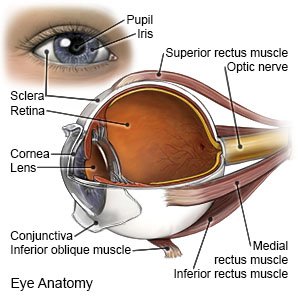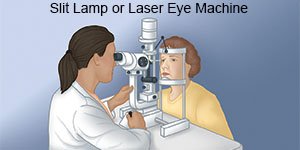Choroidal Nevus
Medically reviewed by Drugs.com. Last updated on May 6, 2024.
What is a choroidal nevus?
A nevus is a freckle that forms under the retina, in the choroid. The choroid is between the sclera and the retina. The retina is the thin layer of tissue that lines the back of your eye. It captures light and sends messages to the brain. A choroidal nevus is not cancer (benign), but it can become cancer over time. This kind of cancer is called choroidal melanoma. Choroidal nevus is a congenital condition. This means you were born with genes that make a nevus develop. They are not found in babies or young children.
 |
What are the signs and symptoms of a choroidal nevus?
You may not have any signs or symptoms if the choroidal nevus is benign. If it is cancer, it may cause your retina to detach (come away from your eye). You may have any of the following if you have choroidal melanoma or your retina detaches:
- Severe pain in or around your eye
- Flashing lights
- Vision loss, or a dark or blind spot in the center of your eye
- Seeing floaters, such as spots, cobwebs, strings, or specks
How is a choroidal nevus diagnosed and treated?
A choroidal nevus is usually found during a routine eye examination. Your eye care provider will use tests and machines that can see to the back of your eye. A nevus will usually be gray, brown, or a similar dark color. Your provider may want to watch the choroidal nevus more closely if it is orange, thick, or has fluid coming from it. This means it may be cancer. You may need to come back in 3 to 6 months to have it checked again. You will need to have it checked every year to make sure it has not changed into cancer. Your provider will take pictures of it to compare with pictures taken over time. A choroidal nevus usually does not need to be treated. It will need to be treated if it becomes cancer.
 |
What can I do to keep my eyes healthy?
You may not be able to prevent choroidal melanoma, but you can help keep your eyes healthy:
- Wear sunglasses with ultraviolet (UV) light protection. UV light from the sun can damage your eyes.
- Eat foods that contain eye-healthy nutrients. Eye-healthy nutrients include vitamin A, vitamin C, vitamin E, omega-3 fatty acids, lutein, and zeaxanthin. Examples of foods that contain these nutrients include spinach, peanuts, salmon, collard greens, avocados, squash, eggs, and blueberries. Ask your healthcare provider for a full list of foods that contain eye-healthy nutrients. You may also need to take a vitamin or supplement to help you get enough of these nutrients.

- Do not smoke. Nicotine and other chemicals in cigarettes and cigars can cause eye and blood vessel damage. Ask your healthcare provider for information if you currently smoke and need help to quit. E-cigarettes or smokeless tobacco still contain nicotine. Talk to your healthcare provider before you use these products.
- Limit alcohol use. Heavy alcohol use may increase your risk for eye diseases. Ask your healthcare provider if it is okay for you to drink alcohol.
When should I call my doctor?
- You have a sudden change in your vision or loss of vision.
- You have eye pain.
- You see more floaters or flashes of light than usual.
- You have questions or concerns about your condition or care.
Care Agreement
You have the right to help plan your care. Learn about your health condition and how it may be treated. Discuss treatment options with your healthcare providers to decide what care you want to receive. You always have the right to refuse treatment. The above information is an educational aid only. It is not intended as medical advice for individual conditions or treatments. Talk to your doctor, nurse or pharmacist before following any medical regimen to see if it is safe and effective for you.© Copyright Merative 2024 Information is for End User's use only and may not be sold, redistributed or otherwise used for commercial purposes.
Further information
Always consult your healthcare provider to ensure the information displayed on this page applies to your personal circumstances.
